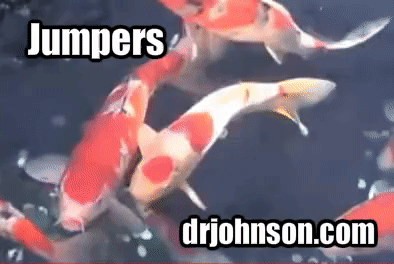Management of fish “jumpers”
When a Koi, goldfish and pond fish decides to end it all and makes the leap to the floor, there are several factors which may dramatically extend it’s survival on the ground until found. If the ambient temperatures are cool the fish will fare better. If the surface is non absorbent it is preferable. If the fish carries considerable water with it to the floor, it may last up to an hour. The longest I have been able to verify a fish out of water is approximately twelve hours: The fish departed a garden pond in the Fall of the year, and wriggled down a hillside into a muddy drainage area where is was encrusted in moist soil. There it lay until morning.
Fish that jump in the heat of summer will desiccate [dry out] quickly and are almost instantly beset with flies. Many will perish as a result of the flies’ breeding frenzy.

When a Koi, goldfish and pond fish is found out of water, do not give up on it unless one of the following is characteristic:
- The skin features cracks in it when flexed
- The fish looks like beef jerky
- The eyes are concave instead of the usual convex appearance
- The pupil is gray, which suggests death came and went more than four hours ago.
- Part of the fish is missing and your cat appears to be quite sated.
If there is any hope that the fish is alive, you may wish to consider the following triage routine:
Immediately place the fish in cool water from the main aquarium. Gently rinse off the debris which is sticking to the fish. Do not rub aggressively or you may tear the skin of smaller fish. You should pry the gill covers open and ensure the passage of water over the gill tissue. Perhaps it’s Mother Nature’s engineering but you may be amazed to find that with the gill covers ‘glued’ shut by the fishes’ own mucus, they have remained quite red and wet.
You should pry the gill covers open!
Replace dirty water you’re cleaning the fish in, with clean tank water at this point. Aerate the water very well and place the fish in an upright position in front of (not in the path of) the airstone or circulation. You are not trying to blow water into the oral cavity. The goal is that if the fish attempts any respiration, it will be taking in the freshest, most well aerated water possible. I saw a person put the fishes’ mouth over a pump and blow its stomach (the ‘wide spot in the intestine’) to smithereens.
Very valuable fish that are discovered alive should be placed in a bag of tank water under pure oxygen. This is a very effective method but is not commonly available to the general hobbyist. An injection of Dexamethasone has been shown to save a considerable number of ‘jumpers’ and in some minds, is mandatory for the success of ‘jumper recovery’. And I’m not talking about the fish that simply swims off when you return it to the water. Dexamethasone is for fish that don’t move when they go back in the water. When they’re “just about dead” time.

After surviving the suicide attempt, you will notice that a considerable portion of the tail and fins will dissolve. The time spent on the floor will have ‘crisped’ the fins and they will die back to the last points of viable blood flow during the event. No treatment is usually necessary. The fish will probably be permanently disfigured but most of the lost fin tissue will grow back.
If sores develop on the body, it may be due to the Dexamethasone, which is profoundly immune-suppressive. Infection will try and set into the scrapes and contusions on the side of the fish from the trip to the floor. Aggressive antibiotic therapy will likely repel a bacterial attack and salvage the fish.




